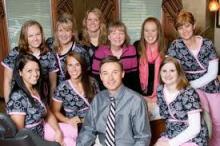As a professional, I am always striving for excellence and enjoy it when I am recognized for it. That recognition can come in the form of higher income, patients referring their family and friends or just personal recognition of a job well done.
I know this always motivates me to strive to do better and I know that same principle should apply to my staff: finding an effective way to recognize them for their individual and group production would motivate them to do even better on their own jobs. For nearly twenty years I searched for such a system without success. Finally, this year, I found it with Sterling and the Hubbard Management system.
I practice in the outer suburbs of Chicago. Over a period of 18 years, I had built a two office practice. I took on an associate, made him a partner, and then sold one of the offices to him. Since I was back down to managing one office, I figured this was a good time to learn how to become a better manager so that as I grow my practice again it would turn out exactly the way I wanted it to be.
I had tried various methods of managing practice growth over the years, but they weren't producing the results I wanted, so I started looking at other practice management techniques. I didn't want something superficial. I wanted a comprehensive system that would begin with improving me as the owner of the practice. I wanted a system firmly grounded in business and personal ethics, not just a few tricks for better advertising or making more money. And I wanted a system that maintained my authority in the practice, not one that was driven by the staff or the office manager.
Sterling offers just such a system. What I liked best about the Sterling training was that it began with a personal inventory. Without telling you what you should think, they help you rediscover your own strengths and personal integrity and then help you integrate that into the management of and communication within your practice.
When I got back to the office, we started sorting out the duties of all the employees. The organizational structure Sterling uses helped us identify areas where no one was responsible. We further refined the job descriptions so that all aspects of a successful practice were covered, and got the staff to take full ownership for their own duties. Once that was done, we were able to establish systems for recognizing everyone for how well they were performing their job responsibilities and contributing to the overall success of the practice.
Over the past eight months, there has been an improvement in the income of the practice, and the staff have been able to share in the improved profitability. But more than the money are the intangible rewards. The staff are accountable for their jobs, they are recognized for their individual and team efforts, and this has given them a heightened sense of pride. The goal is for all of them to execute at a high level of performance and they are accomplishing that. I am really delighted to give them their own games and see them succeed. I take a lot of pleasure in seeing that they are happy.
For me personally, the Hubbard administrative system has given me a way to objectively look at situations in the practice and understand them, rather than reacting to them emotionally. As a result, I am able to see when something needs to be changed and to follow through and see that it does get changed.
I went into the Sterling program to learn to be a better manager and I have. I have my vision of how I want the practice to be, and the staff is supporting that vision. Together we are bringing that vision into reality.
Todd Curtis, DDS, MS

